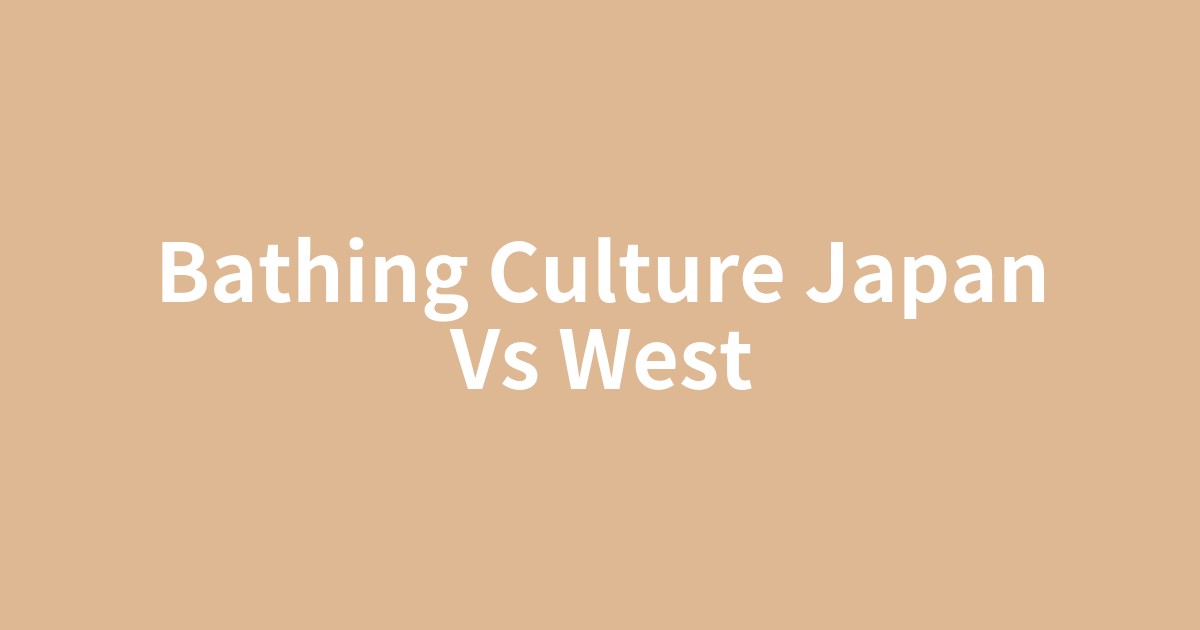このページは、歴史や文化の物語を楽しみながら、その文脈の中で重要な英単語を自然に学ぶための学習コンテンツです。各セクションの下にあるボタンで、いつでも日本語と英語を切り替えることができます。背景知識を日本語で学んだ後、英語の本文を読むことで、より深い理解と語彙力の向上を目指します。

一日の疲れを癒す、湯船に浸かる日本の入浴スタイル。体を清潔にするための機能的なシャワー。入浴という行為に込められた、文化的なvalue(価値観)の違い。
この記事で抑えるべきポイント
- ✓日本の入浴がリラクゼーションや精神的な癒しを重視するのに対し、欧米のシャワーは身体を清潔にするという機能性を優先する傾向があるという、目的に見られる文化的な違い。
- ✓日本の入浴文化の背景には、仏教の「沐浴」の教えや豊富な温泉資源があり、共同体での入浴習慣が育まれた歴史がある一方、欧米では古代ローマ文化の衰退後、個人の衛生観念と共にシャワーが普及したという歴史的経緯。
- ✓入浴という日常行為には、日本の「癒し」や「精神性」を重んじる価値観と、欧米の「効率性」や「機能性」を重視する価値観が反映されているという見方があること。
日本の「お風呂」文化 vs 欧米の「シャワー」文化
一日の終わり、あなたは熱いお風呂にゆっくり浸かりますか?それとも手早くシャワーを浴びますか?この何気ない日常の選択の背後には、実は日本と欧米の深い文化的な価値観の違いが隠されているのかもしれません。体を清潔にするという共通の目的を持ちながら、なぜこれほど異なる習慣が根付いたのでしょうか。この入浴という行為を通して、文化の深層を探る旅に出かけましょう。
Japan's "Bath" Culture vs. The West's "Shower" Culture
At the end of the day, do you take a long, hot bath, or a quick shower? Behind this simple, everyday choice may lie a deep cultural difference in values between Japan and the West. While the purpose of cleansing the body is mutual, why have such different customs taken root? Let's embark on a journey to explore the depths of culture through the act of bathing.
「癒し」か「洗浄」か?入浴に求めるものの違い
日本の入浴文化を語る上で欠かせないのが、心身のくつろぎ、すなわちリラクゼーション(relaxation)の追求です。湯船に体を沈め、一日の疲れを癒す時間は、単に体を清潔にするという衛生(hygiene)上の目的を超え、精神的な安らぎを得るための大切なひとときと捉えられています。それはまるで、心と体をリセットするための日常的な儀式(ritual)のようです。
"Healing" or "Cleansing"? The Different Purposes of Bathing
An essential aspect of Japanese bathing culture is the pursuit of mental and physical relaxation. The time spent soaking in a tub to relieve the day's fatigue is seen as more than just for hygiene; it is a precious moment for finding spiritual peace. It's like a daily ritual to reset both mind and body.
温泉と沐浴の国・日本 vs 公衆浴場から個室シャワーへの道・欧米
日本の豊かな入浴文化のルーツは、その地理的特徴と宗教観に深く根差しています。火山国である日本は豊富な温泉資源に恵まれ、古くから人々は自然の恵みとして温泉に親しんできました。また、仏教における「沐浴」の教えは、体の汚れを落とすことが心の浄化に繋がるとし、入浴の精神性を高めました。こうした背景から、銭湯に代表されるような共同の(communal)入浴習慣が育まれ、地域社会のコミュニケーションの場としても機能してきたのです。
Japan, Land of Hot Springs and Monk's Baths vs. The West's Path from Public to Private Showers
The roots of Japan's rich bathing culture are deeply embedded in its geography and religious views. As a volcanic country, Japan is blessed with abundant hot springs, and people have long enjoyed them as a gift of nature. Furthermore, the Buddhist teaching of "mokuyoku" (ritual bathing) enhanced the spiritual aspect of bathing, suggesting that washing away physical dirt leads to purification of the soul. From this background, communal bathing customs, represented by public bathhouses (sento), developed and also served as a place for community communication.
湯船に映る価値観 - "Well-being"と"Efficiency"
日本の湯船に浸かるという行為、すなわちお風呂(bath)は、単なる健康維持以上の意味を持っています。それは心身ともに満たされた状態を指すウェルビーイング(well-being)に深く関わるという価値観(value)の表れと言えるでしょう。温かい湯がもたらす肉体的な安らぎと、静かな時間がもたらす精神的な落ち着きは、現代人が求める総合的な幸福感に繋がっています。
Values Reflected in the Bathtub - "Well-being" and "Efficiency"
The act of soaking in a Japanese tub, the bath, holds a meaning beyond mere health maintenance. It can be seen as a reflection of a value system connected to well-being, a state of being holistically healthy and happy. The physical comfort from the warm water and the mental calm from the quiet time contribute to the comprehensive sense of happiness that modern people seek.
結論
日本の風呂文化と欧米のシャワー文化、そのどちらが優れているという話ではありません。これらは、それぞれの土地の歴史、自然環境、そして人々が大切にしてきた価値観が長い時間をかけて育んだ、文化の多様性の美しい表れです。一日の終わりに湯船に浸かる時、あるいはシャワーを浴びる時、その行為の背景にある文化の違いに思いを馳せてみてはいかがでしょうか。日常の習慣の中にこそ、異文化を理解する鍵が隠されているのです。
Conclusion
It is not a matter of which is superior, Japanese bath culture or Western shower culture. They are beautiful expressions of cultural diversity, nurtured over long periods by the history, natural environment, and values cherished by each people. At the end of the day, when you soak in the tub or take a shower, why not reflect on the cultural differences behind the act? The key to understanding different cultures is often hidden in our daily routines.